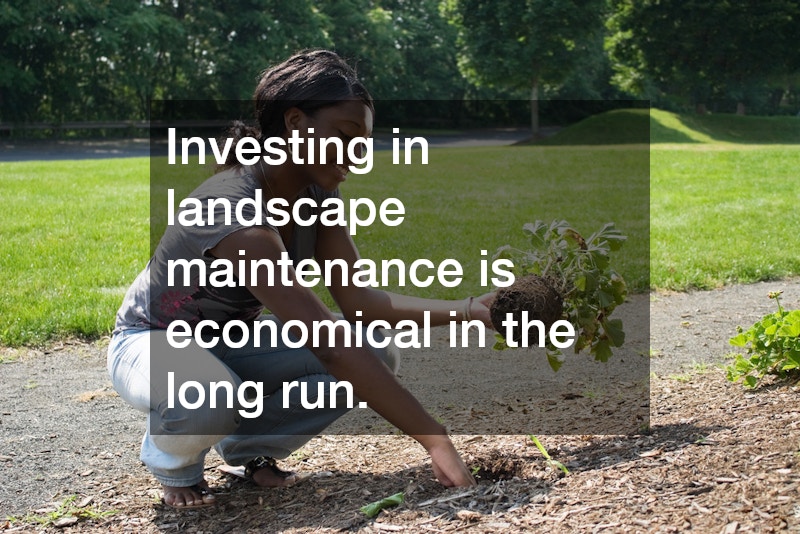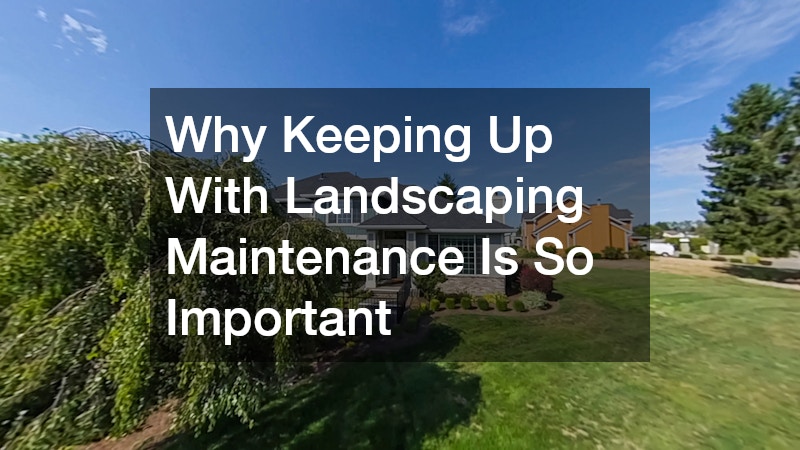Maintaining your landscape is critical for enhancing your property’s curb appeal. A well-maintained garden or lawn immediately creates a positive first impression, making your property more inviting to guests or potential buyers. Curb appeal is not just an aesthetic advantage; it can increase the value of your property. A tidy, vibrant landscape indicates that the property is well-cared for. Many real estate experts agree that good landscaping can add significant value to a home.
Investing in landscape maintenance is economical in the long run. Basic upkeep like mowing, edging, and watering prevents bigger issues that can be costly to fix. For instance, poorly maintained lawns can experience soil erosion and weed overgrowth, leading to expensive restoration efforts. Regular maintenance ensures that each aspect of your landscape remains healthy and vibrant. It also reduces the likelihood of having to replace dead plants or undertake major fixes.
In addition to enhancing property value, a beautiful landscape can improve emotional well-being. Green spaces are proven to reduce stress and promote relaxation. They serve as a personal oasis where one can unwind after a long day. Investing time in the garden can also be a therapeutic activity, providing both physical exercise and a sense of accomplishment. It’s important to remember that a lush garden requires consistent care.
Environmental and Health Benefits
Maintaining your landscape is also crucial for environmental reasons. Well-maintained lawns absorb pollutants from the air, including dust and smoke particles, making the air cleaner for you and your family. Trees and plants can lower urban air temperatures by as much as 10°F, reducing the need for air conditioning and lowering energy costs. Landscape maintenance supports biodiversity, providing habitats for various insects and animals. This biodiversity is essential for maintaining ecological balance.
In addition to improving air quality, landscapes help manage water distribution. Proper landscaping practices reduce runoff and erosion, capturing rainwater more effectively. This process helps to replenish groundwater resources. A well-organized landscape can also serve as a natural barrier, absorbing water and reducing flood risk in neighboring areas. This ultimately supports local water conservation efforts, a vital environmental concern.
A healthy landscape contributes to public health by promoting exercise and outdoor activity. People are more likely to engage in physical activities like walking, gardening, or playing sports in well-maintained green spaces. These activities increase cardiovascular fitness, muscular strength, and mental health. Additionally, well-designed landscapes can include areas specifically tailored for physical exercises, such as walking paths or outdoor gyms. Thus, landscape maintenance becomes an investment not only in property value but also in overall health and wellness.
Preventative Measures Against Pests and Diseases
Regular landscape maintenance acts as a safeguard against various pest and disease issues. Unkempt gardens can become breeding grounds for insects like mosquitoes and ticks, which carry diseases. Consistent maintenance, including removing dead leaves and branches, reduces these habitats. It ensures that pests do not get the opportunity to multiply. Moreover, well-maintained plants are less prone to diseases and damage caused by pests.
Soil health is another critical component of preventing pest invasions. Nutrient-rich soil promotes the growth of strong, healthy plants that can withstand minor pest attacks. Fertilizing and aerating the soil on a regular basis ensures a thriving landscape. Healthy plants and soil naturally improve resistance to both bugs and diseases, reducing the need for chemical pesticides. This approach is also more environmentally friendly.
Landscape maintenance serves as an early warning system for pest and disease detection. Regular inspections of plants make it easier to spot the initial signs of problems. This allows homeowners to take action before these issues cause irreversible damage. Early intervention typically involves fewer resources, both in terms of time and money, to resolve. By the time problems are visible to the untrained eye, it might already be too late, making regular maintenance all the more important.
Personal Satisfaction and Enjoyment
Beyond practical reasons, keeping up with your landscape offers personal satisfaction. For many, cultivating a garden becomes a rewarding hobby. Seeing plants thrive and bloom under your care can provide immense joy. Gardens can be spaces for creative expression with opportunities to showcase style and personality. This creative outlet can lead to a deep sense of fulfillment.
Well-maintained landscapes extend living spaces outdoors, offering areas for family gatherings and social events. Decks, patios, and gardens can become extensions of your home, providing comfort and relaxation zones. Gardens often serve as tranquil spaces to meditate or read, their visual beauty inspiring relaxation and contentment. They become personalized spaces that reflect taste and lifestyle. The key to this enjoyment is diligent landscape maintenance.
Lastly, landscape maintenance fosters a connection with nature. It encourages a greater appreciation for the environment and natural cycles. As you become more involved, you tend to notice the subtle changes in seasons, the growth of plants, and the adhering cycles of nature. This can instill a sense of responsibility towards eco-friendly practices. Overall, it enriches your relationship with the natural world and enhances your quality of life.

